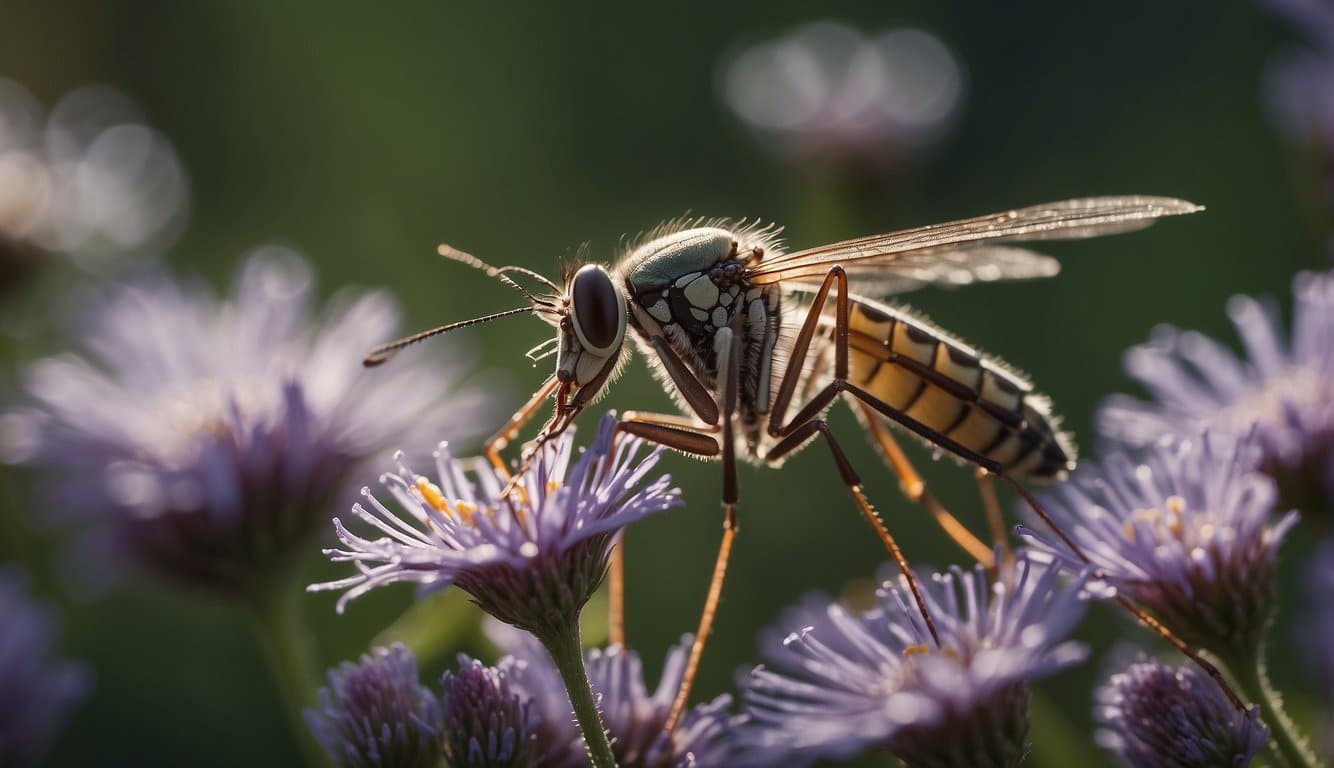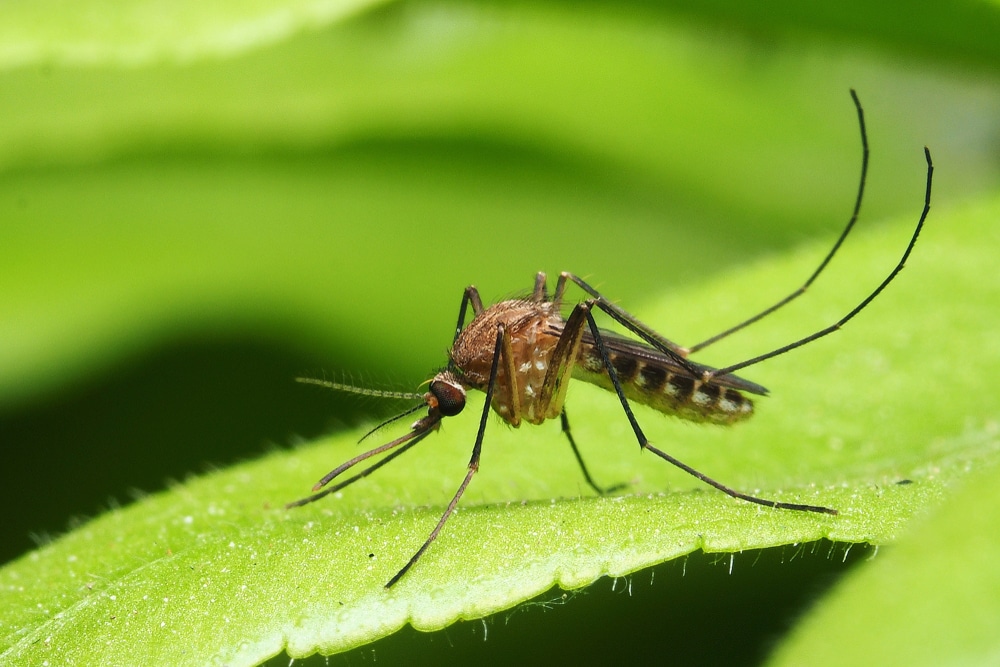When evaluating the complex tapestry of our ecosystem, you might not consider the pesky mosquito as a creature of significant ecological value. However, stepping beyond their infamous role as biters and disease vectors, mosquitoes also engage in an activity that may surprise you: pollination.
Just like bees and butterflies, mosquitoes can contribute to the spread of pollen from plant to plant, playing a vital role in the reproductive cycles of various flora.
You might find it intriguing that while mosquitoes are often vilified, their involvement in ecosystems is multifaceted.
For instance, the Aedes communis, a type of mosquito, has been identified as a key pollinator for certain species of orchids, indicating that these insects can indeed be pollinators.
Moreover, their existence as both prey and pollinators cements their importance in the food web, supporting the survival of numerous wildlife species.
Role of Mosquitoes in Pollination
When you think of pollinators, mosquitoes might not be the first creatures that come to mind. Yet, these insects play a more significant role in pollination than generally recognized.
Mosquitoes as Accidental Pollinators
Mosquitoes, often in pursuit of nectar for energy, inadvertently pick up pollen and transfer it between flowers.
This accidental pollination is similar to the behavior exhibited by more commonly known pollinators such as bees and butterflies. However, mosquitoes are less efficient at this process.
Their importance as pollinators becomes more pronounced in certain ecosystems, especially where other pollinators are scarce.
Specific Plants Pollinated by Mosquitoes
There are certain plants for which mosquitoes act as crucial pollinators.
The Aedes communis, also known as the snow pool mosquito, is known for pollinating orchids in northern regions.
Additionally, mosquitoes are known to pollinate plants like goldenrods, as well as some grasses and other flowering plants that are typically found in the Arctic, where alternative pollinators are not as prevalent.
Comparison to Other Pollinators
When you think about pollinators, bees and butterflies likely come to mind first, renowned for their roles in the pollination process. Yet, mosquitoes also play a part, albeit lesser-known, and it’s important to understand how they compare in efficiency and impact.
Mosquitoes Versus Bees and Butterflies
Bees and butterflies are often heralded as champion pollinators. They have specialized body structures, like bees’ pollen baskets and butterflies’ long proboscises, which are highly effective for transferring pollen from plant to plant.
Their foraging patterns are also more targeted towards gathering nectar, which inadvertently results in pollination.
In contrast, mosquitoes have a different approach.
Some species, such as woodland mosquitoes, are known to contribute to pollination. However, they lack the specialized structures that make bees and butterflies so efficient.
Instead, mosquitoes inadvertently collect pollen on their bodies while feeding on floral nectars, especially from certain plants like goldenrods, and transfer it in a less direct fashion. Discover how mosquitoes contribute with goldenrod pollination here.
Efficiency of Mosquitoes in Pollination

While mosquitoes do participate in pollination, their efficiency is not on par with bees or butterflies.
They are not purpose-driven pollinators and do not have the same floral preferences. Their contribution is incidental rather than intentional, and the amount of pollen they transfer is significantly less.
For certain plants, however, the presence of mosquitoes can be advantageous.
Arctic environments, for example, see benefits from mosquito pollination due to the scarcity of other insects.
The extent of their contribution varies greatly among ecosystems and needs more research for a comprehensive understanding. To learn how mosquitoes fit in the broader spectrum of pollinators, consider this insight into mosquito pollination.
Impact of Mosquito Pollination on Ecosystems
While mosquitoes are typically noted for their role as a nuisance, their contributions to pollination are a lesser-known, yet valuable aspect of their existence. As you explore the natural world, you’ll find that mosquitoes are inadvertent pollinators, meaning they transfer pollen as they seek out nectar for nourishment.
- Pollination of Specific Flora: The interaction between mosquitoes and certain plants is critical. For instance, mosquitoes are known to be pollinators of the blunt-leaf orchid Aedes communis.
- Diverse Plant Species: Beyond specific examples, mosquitoes play a role in the pollination of thousands of plant species, including those in wetter ecosystems where such interaction is more likely to occur.
When evaluating the food web, mosquitoes serve as a significant link.
- Ecological Balance: The presence of mosquito pollinators sustains the populations of certain plants, particularly in unique ecosystems. This balance ensures the survival of both flora and the fauna relying on them.
Conservation and Ecological Significance
When considering the role of mosquitoes in the environment, it’s essential to recognize their contribution to conservation and the broader ecosystem. As unexpected as it may sound, these often maligned insects are more than just pests; they are an integral part of ecological networks.
- Pollination: While not often acknowledged, mosquitoes participate in pollinating plants, a vital process for the survival of numerous plant species. Much like bees, mosquitoes transfer pollen as they feed on nectar, albeit less efficiently.
- Food Web: The presence of mosquitoes is crucial for many predators. They serve as a primary food resource for a diversity of animals, from aquatic larvae to adult insects. Predators such as dragonflies, fish, and bats heavily rely on mosquitoes for sustenance, as highlighted by the National Wildlife Federation Blog.
Your understanding of mosquitoes shouldn’t be restricted to the itchy welts they leave behind. Consider their unseen role in supporting diverse species, which has a cascading impact on ecosystem health.
- Biodiversity Support: By existing as prey, mosquitoes enable predator species to thrive, which in turn helps maintain the balance of various other populations within the ecosystem.
It’s worth noting that any initiatives undertaken to manage or reduce mosquito populations must be carefully considered.
Overly aggressive measures, without regard for their role in the ecosystem, could unintentionally harm the species that depend on them, disrupt pollination, and detrimentally affect the ecological balance.
Frequently Asked Questions
When exploring the intricate dance of pollination, you’ll discover that mosquitoes, often seen as mere pests, are not as one-dimensional as they appear.
What role do mosquitoes play in pollination compared to bees?
While bees are well-known as pollinators extraordinary, mosquitoes have their own niche, often pollinating plants like orchids in specific regions.
For example, Aedes communis is an important pollinator for orchids in northern areas where bees are less prevalent.
Do mosquitoes serve any benefits to the ecosystem?
Yes, they do. Beyond pollination, mosquitoes are integral in the food web, with many creatures relying on them for food.
For instance, various species of fish, birds, and bats feast on mosquito larvae and adults, which directly benefits biodiversity in numerous ecosystems.
How does the feeding behavior of mosquitoes impact pollination?
Mosquitoes feed on nectar for energy, and during this process, they inadvertently transfer pollen from one flower to another.
While they are not as efficient as bees, their pollinating activities particularly benefit certain types of flowers that bloom at night or in shaded areas, expanding the scope of pollination.
What is the ecological impact of a potential mosquito extinction?
The elimination of mosquitoes could create a void in the food chain, potentially harming species that prey on them, and adversely affecting the pollination of certain plants.
Although hard to predict, the ecological consequences of mosquito extinction could be profound given their roles in ecosystems worldwide.
What dietary habits do mosquitoes have that contribute to pollination?
Mosquito adults often consume floral nectar for energy, and while doing so, they collect pollen on their bodies and facilitate the process of cross-pollination, much like other nectar-feeding insects.
This incidental pollinator role supports various plant species in reproducing and surviving.
Are there any documented advantages to the presence of mosquitoes in the environment?
Beyond being a food source and pollinators, mosquitoes help maintain healthy ecosystems by influencing the population dynamics of other species.
Additionally, as irritating as they can be to humans, their mere presence indicates the health of an environment, serving as bioindicators for scientists studying habitats.

